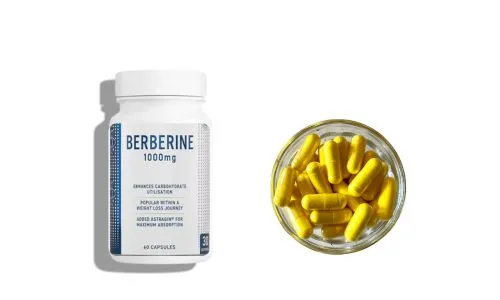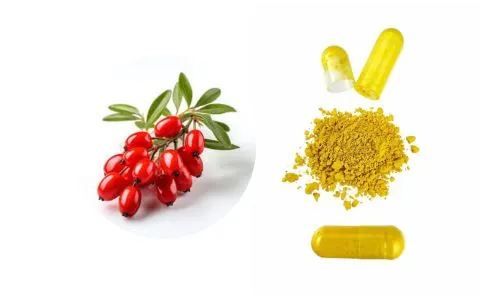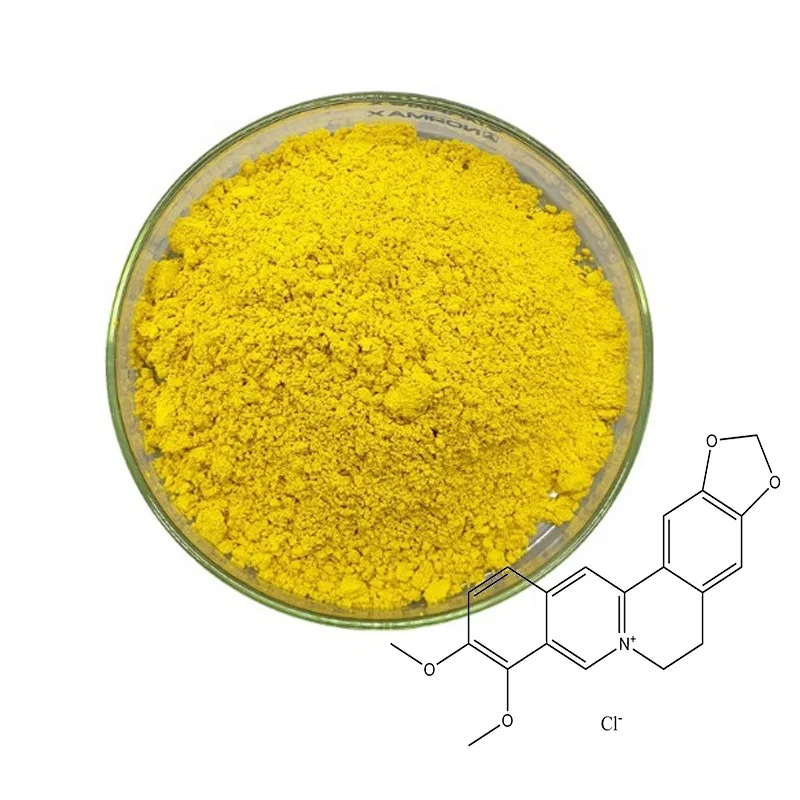Berberine Hydrochloride: A Natural Solution for Improving Metabolic Health
Metabolic health is a cornerstone of overall wellness, influencing everything from energy levels to chronic disease prevention. For food and beverage manufacturers, nutraceutical producers, and ingredient distributors seeking natural solutions, berberine hydrochloride emerges as a potent ally. Extracted from plants like Berberis vulgaris, this compound has been celebrated in traditional medicine for centuries and is now backed by modern science for its metabolic benefits. Berberine hydrochloride supports healthy blood sugar levels, enhances insulin sensitivity, and aids in maintaining balanced lipid profiles. Its natural origin aligns perfectly with the growing demand for clean-label, plant-based ingredients in products ranging from dietary supplements to functional foods. Whether you're formulating a new dairy product, a bakery item, or a nutraceutical blend, incorporating berberine hydrochloride can elevate your offerings with science-backed health benefits.

Berberine Hydrochloride: A Potent Natural Remedy for Metabolism
Understanding the Power of Berberine in Metabolism
The digestive system is the complex handle that administers how our bodies change nourishment into vitality, and keeping up its proficiency is crucial for general well-being. Berberine hydrochloride, determined from plants like goldenseal and barberry, has picked up consideration for its capacity to back metabolic work, actually. Not at all like engineered choices, this compound offers a plant-based arrangement that reverberates with shoppers looking for clean-label items. For nourishment and refreshment producers, especially those in the dairy, pastry shop, and nutraceutical segments, berberine presents an opportunity to make utilitarian items that cater to health-conscious buyers. Its capacity to control metabolic pathways, such as enacting AMP-activated protein kinase (AMPK), makes it a standout fixing. AMPK is frequently alluded to as the "metabolic ace switch," helping to adjust vitality generation and utilization.
The Science Behind Berberine’s Metabolic Benefits
Scientific research has illuminated the mechanisms through which berberine enhances metabolism. Studies have shown that this compound can influence glucose and lipid metabolism, making it a valuable addition to products targeting metabolic syndrome. For instance, berberine has been found to reduce glucose production in the liver, a key factor in maintaining healthy blood sugar levels. This is particularly relevant for producers of convenience foods, such as instant noodles or canned goods, where adding functional ingredients can elevate nutritional profiles. Moreover, berberine’s ability to enhance mitochondrial function supports energy production at the cellular level, which is crucial for maintaining metabolic efficiency. For pet food manufacturers, incorporating berberine into formulations can also support the metabolic health of animals, aligning with the growing trend of premium pet nutrition.
Why Choose Berberine for Your Product Line?
The demand for natural, science-backed ingredients is on the rise, and berberine hydrochloride fits the bill perfectly. Its natural origin and robust research backing make it an attractive option for food service providers and specialized ingredient distributors focusing on functional ingredients. Imagine adding berberine to a seasoning blend or a dietary supplement—its metabolic benefits can enhance the value proposition of your products. Additionally, berberine’s stability in various formulations ensures it can be seamlessly integrated into a wide range of applications, from confectionery to meat and seafood processing. At Yangge Biotech, we provide high-quality berberine extracts that meet stringent ISO, HACCP, Kosher, and Halal standards, ensuring your products are both effective and compliant.

How Berberine Supports Healthy Blood Sugar Levels Naturally?
The Role of Berberine in Glucose Regulation
Maintaining healthy blood sugar levels is a priority for many consumers, and berberine offers a natural way to support this goal. For food and beverage manufacturers, particularly those in the dairy and bakery sectors, incorporating berberine into products can address the growing demand for functional foods. This compound works by influencing several pathways involved in glucose metabolism. It reduces glucose absorption in the intestines, decreases liver glucose production, and enhances insulin sensitivity. These actions collectively help maintain balanced blood sugar levels, making berberine an excellent choice for formulating products like yogurt, bread, or even snacks. For nutraceutical manufacturers, berberine can be a key ingredient in supplements targeting metabolic health, offering a natural alternative to synthetic options.
Berberine’s Impact on Glycemic Control
Glycemic control is essential for preventing chronic conditions like diabetes, and berberine has shown promising results in this area. Research indicates that berberine can lower fasting blood glucose and HbA1c levels, which are critical markers of long-term blood sugar management. This is particularly relevant for producers of convenience foods, such as instant rice or canned goods, where adding functional ingredients can enhance nutritional value. For ingredient distributors, supplying berberine to clients in the confectionery or seasoning industry can help create products that cater to health-conscious consumers.
Practical Applications of Berberine in Food and Supplements
Incorporating berberine into your formulations is easier than you might think. Its stability and compatibility with various matrices make it suitable for a wide range of applications. For instance, dairy producers can add berberine to fermented products like kefir or cheese, enhancing their metabolic benefits. Bakery producers can incorporate it into bread or pastries, offering consumers a convenient way to support blood sugar health. For food service providers, berberine can be used in seasoning blends or condiment formulations, adding a functional twist to everyday meals. At Yangge Biotech, we offer high-quality berberine extracts that meet rigorous quality standards, ensuring your products deliver on both efficacy and safety.

Improving Lipid Profiles: The Role of Berberine in Metabolic Health
Understanding Lipid Profiles and Metabolic Health
Lipid profiles, which include cholesterol and triglyceride levels, play a crucial role in metabolic health. Imbalanced lipid levels can contribute to cardiovascular issues, making it essential to address them through diet and supplementation. Berberine has been shown to improve lipid profiles naturally, making it an excellent choice for food and beverage manufacturers. For dairy producers, adding berberine to products like milk or yogurt can enhance their heart-healthy credentials. Similarly, bakery producers can incorporate it into bread or muffins, offering consumers a functional option for managing lipid levels. The natural origin of berberine aligns with the clean-label trend, making it an attractive ingredient for nutraceutical and dietary supplement manufacturers.
How Berberine Influences Lipid Metabolism?
Berberine’s impact on lipid metabolism is well-documented in scientific literature. It works by reducing the production of low-density lipoprotein (LDL) cholesterol, often referred to as "bad" cholesterol, while increasing high-density lipoprotein (HDL) cholesterol, known as "good" cholesterol. This dual action helps maintain a healthy lipid balance, which is crucial for cardiovascular health. For meat and seafood processors, incorporating berberine into marinades or coatings can add a functional element to their products. Ingredient distributors can supply berberine to clients in the confectionery or seasoning industry, enabling them to create heart-healthy formulations.
Leveraging Berberine for Heart-Healthy Products
The demand for heart-healthy products is on the rise, and berberine offers a natural solution. Its ability to improve lipid profiles makes it an ideal ingredient for a wide range of applications. For instance, convenience food producers can add berberine to instant noodles or canned goods, enhancing their nutritional value. Food service providers can incorporate it into seasoning blends or condiments, offering consumers a convenient way to support heart health. At Yangge Biotech, we provide high-quality berberine extracts that meet stringent quality standards, ensuring your products deliver on both efficacy and safety. By leveraging berberine’s lipid-regulating properties, you can create innovative products that cater to health-conscious consumers.

Berberine Hydrochloride: A Key Player in Weight Management
The Connection Between Berberine and Weight Management
Weight management is a top priority for many consumers, and berberine hydrochloride offers a natural way to support this goal. For food and beverage manufacturers, particularly those in the bakery and confectionery sectors, incorporating berberine into products can address the growing demand for functional foods. This compound works by influencing several pathways involved in weight regulation, including fat metabolism and appetite control. By activating AMPK, berberine helps regulate energy balance, promoting fat breakdown and reducing fat storage. This makes it an excellent choice for formulating products like cookies, chocolates, or even snacks that cater to weight-conscious consumers.
Berberine’s Role in Reducing Fat Accumulation
Excess fat accumulation is a major contributor to weight gain, and berberine has shown promising results in addressing this issue. Research indicates that berberine can inhibit the differentiation of preadipocytes into mature fat cells, effectively reducing fat accumulation. This is particularly relevant for producers of convenience foods, such as instant noodles or canned goods, where adding functional ingredients can enhance nutritional profiles. For ingredient distributors, supplying berberine to clients in the seasoning or condiment industry can help create products that support weight management. Moreover, berberine’s natural origin aligns with the clean-label trend, making it an attractive option for pet food manufacturers looking to support the weight health of animals. Its versatility and efficacy make it a valuable addition to any product line.
Practical Applications of Berberine in Weight-Conscious Formulations
Incorporating berberine into your formulations is a straightforward way to enhance their weight management benefits. Its stability and compatibility with various matrices make it suitable for a wide range of applications. For instance, dairy producers can add berberine to yogurt or cheese, offering consumers a convenient way to support their weight goals. Bakery producers can incorporate it into bread or pastries, creating functional treats that align with health trends. For food service providers, berberine can be used in seasoning blends or condiment formulations, adding a weight-conscious twist to everyday meals. At Yangge Biotech, we offer high-quality berberine extracts that meet rigorous quality standards, ensuring your products deliver on both efficacy and safety. By leveraging berberine’s weight-regulating properties, you can create innovative products that stand out in the market.

Boosting Insulin Sensitivity with Berberine for Better Health
The Importance of Insulin Sensitivity in Metabolic Health
Insulin sensitivity is a critical factor in maintaining metabolic health, as it determines how effectively the body responds to insulin and regulates blood sugar levels. Poor insulin sensitivity can lead to conditions like insulin resistance and type 2 diabetes, making it essential to address through diet and supplementation. Berberine has been shown to enhance insulin sensitivity naturally, making it an excellent choice for food and beverage manufacturers. For dairy producers, adding berberine to products like milk or yogurt can enhance their metabolic benefits. Similarly, bakery producers can incorporate it into bread or muffins, offering consumers a functional option for supporting insulin health. The natural origin of berberine hydrochloride aligns with the clean-label trend, making it an attractive ingredient for nutraceutical and dietary supplement manufacturers.
How Berberine Enhances Insulin Sensitivity?
Berberine’s impact on insulin sensitivity is well-documented in scientific literature. It works by activating AMPK, which enhances glucose uptake in cells and improves insulin signaling. This dual action helps maintain healthy blood sugar levels and reduces the risk of insulin resistance. For meat and seafood processors, incorporating berberine into marinades or coatings can add a functional element to their products. Ingredient distributors can supply berberine to clients in the confectionery or seasoning industry, enabling them to create insulin-supportive formulations. Additionally, berberine’s ability to reduce inflammation and oxidative stress makes it a valuable addition to pet food formulations, supporting the metabolic health of animals. Its versatility and efficacy make it a valuable addition to any product line.
Leveraging Berberine for Insulin-Supportive Products
The demand for insulin-supportive products is on the rise, and berberine offers a natural solution. Its ability to enhance insulin sensitivity makes it an ideal ingredient for a wide range of applications. For instance, convenience food producers can add berberine to instant noodles or canned goods, enhancing their nutritional value. Food service providers can incorporate it into seasoning blends or condiments, offering consumers a convenient way to support insulin health. At Yangge Biotech, we provide high-quality berberine extracts that meet stringent quality standards, ensuring your products deliver on both efficacy and safety. By leveraging berberine’s insulin-regulating properties, you can create innovative products that cater to health-conscious consumers.

Incorporating Berberine into Your Routine for Enhanced Metabolic Function
Why Berberine is a Versatile Addition to Your Routine?
Incorporating berberine into your daily routine or product formulations can significantly enhance metabolic function. Its versatility makes it suitable for a wide range of applications, from dietary supplements to functional foods. For food and beverage manufacturers, particularly those in the dairy and bakery sectors, berberine offers a natural way to support metabolic health. This compound works by influencing several pathways involved in metabolism, including glucose regulation, lipid metabolism, and insulin sensitivity. By adding berberine to products like yogurt, bread, or even snacks, you can cater to health-conscious consumers seeking functional options. For nutraceutical manufacturers, berberine can be a key ingredient in supplements targeting metabolic health, offering a natural alternative to synthetic options.
Practical Ways to Incorporate Berberine into Formulations
Incorporating berberine into your formulations is easier than you might think. Its stability and compatibility with various matrices make it suitable for a wide range of applications. For instance, dairy producers can add berberine to fermented products like kefir or cheese, enhancing their metabolic benefits. Bakery producers can incorporate it into bread or pastries, offering consumers a convenient way to support metabolic health. For food service providers, berberine can be used in seasoning blends or condiment formulations, adding a functional twist to everyday meals. Additionally, berberine’s natural origin aligns with the clean-label trend, making it an attractive option for pet food manufacturers looking to support the metabolic health of animals. Its versatility and efficacy make it a valuable addition to any product line.
The Benefits of Consistent Berberine Use
Consistency is key when it comes to reaping the benefits of berberine. Regular use can help maintain healthy blood sugar levels, improve lipid profiles, and enhance insulin sensitivity, making it an excellent choice for long-term metabolic support. For ingredient distributors, supplying berberine to clients in the confectionery or seasoning industry can help create products that cater to health-conscious consumers. Moreover, berberine’s ability to support weight management makes it a valuable addition to convenience foods, such as instant noodles or canned goods. At Yangge Biotech, we offer high-quality berberine extracts that meet rigorous quality standards, ensuring your products deliver on both efficacy and safety. By incorporating berberine into your routine or formulations, you can create innovative products that stand out in the market.

Conclusion
Berberine hydrochloride stands out as a natural, science-backed solution for improving metabolic health, offering benefits like balanced blood sugar levels, enhanced insulin sensitivity, and improved lipid profiles. Its versatility makes it an ideal ingredient for food and beverage manufacturers, nutraceutical producers, and ingredient distributors looking to create functional products that resonate with health-conscious consumers. Whether you're formulating dairy products, bakery items, or dietary supplements, berberine can elevate your offerings with its metabolic benefits. By incorporating this potent compound into your formulations, you can meet the growing demand for clean-label, plant-based ingredients while supporting overall wellness.
At Yangge Biotech, we specialize in providing high-quality, natural plant extracts like berberine hydrochloride, tailored to meet the needs of food and beverage manufacturers, nutraceutical producers, and ingredient distributors. Our ISO, HACCP, Kosher, and Halal certifications ensure that our products meet the highest standards of quality and safety. With dedicated R&D and production teams, 24-hour online services, and a commitment to innovation, we deliver raw material solutions that help your products stand out in the market. Curious about how we can support your next project? Contact us at info@yanggebiotech.com to learn more about our offerings and elevate your formulations with natural, effective ingredients.
FAQ
Q: Can we get some samples to test before purchasing?
A: Of course, we can provide free samples of 20 to 100 grams, but the shipping cost is at the customer's expense. The shipping cost can be deducted from the next order, or the samples can be sent through your courier account.
Q: Do your products have relevant certifications?
A: Yes, our products are certified for HALAL, ISO, HACCP, Kosher, and other certifications.
Q: What is the minimum order quantity (MOQ)?
A: Small batches of samples can be customized according to your requirements.
Q: Do you offer OEM and ODM services? Can the formula be customized based on our own?
A: Of course, we provide ODM and OEM services to many customers. Our product range includes softgels, capsules, tablets, sachets, granules, and private label services. Simply contact us and let us know your requirements. Our experienced R&D team can also develop new products with specific formulas.
Please contact us to design your own branded products.
Q: How do you handle quality complaints?
A: First, we have a comprehensive quality control SOP. We provide authoritative third-party inspection reports for almost all products before shipment to minimize the possibility of quality issues. Second, we have a comprehensive return and exchange procedure. If there is a genuine quality dispute, we will strictly follow the SOP.
Q: How do you ship? How long does delivery take?
A: For small orders, we typically use DHL, UPS, EMS, FedEx, or TNT. Delivery typically takes 3-7 days. We also offer air and sea freight services. We have a strong freight forwarding team and can provide you with a one-stop service, including DDP and DDU.
Q: What are your payment terms?
A: 100% prepayment, payable by T/T, Western Union, MoneyGram, or PayPal.
Q: What is the shelf life of your products?
A: 2 years with proper storage.
Q: Is the packaging environmentally friendly?
A: We attach great importance to environmental protection and are constantly improving our product packaging. Some products are packaged in recyclable paper. Packaging materials are carefully selected to ensure product safety during transportation and storage, and to minimize environmental impact. We are committed to achieving a balance between environmental friendliness and practicality in our product packaging, and to contributing to sustainable development.
References
1. Zhang, Y., et al. (2008). "Treatment of type 2 diabetes and dyslipidemia with the natural plant alkaloid berberine." Journal of Clinical Endocrinology & Metabolism, 93(7), 2559-2565.
2. Yin, J., et al. (2008). "Efficacy of berberine in patients with type 2 diabetes mellitus." Metabolism, 57(5), 712-717.
3. Kong, W., et al. (2004). "Berberine is a novel cholesterol-lowering drug working through a unique mechanism distinct from statins." Nature Medicine, 10(12), 1344-1351.
4. Lee, Y. S., et al. (2006). "Berberine, a natural plant product, activates AMP-activated protein kinase with beneficial metabolic effects in diabetic and insulin-resistant states." Diabetes, 55(8), 2256-2264.
5. Hu, Y., et al. (2012). "Lipid-lowering effect of berberine

Based on your location and order quantity, you will have the opportunity to receive a limited time free shipping promotion!

Who we are


